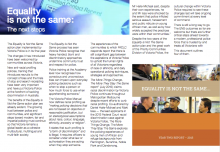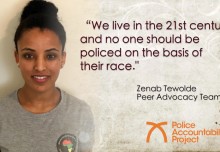 In a landmark settlement to a racial discrimination claim brought by six young African-Australian men, Victoria Police this year agreed to a public inquiry aimed at stamping out racial profiling in police practices. Anthony Kelly outlines the case and its implications.
In a landmark settlement to a racial discrimination claim brought by six young African-Australian men, Victoria Police this year agreed to a public inquiry aimed at stamping out racial profiling in police practices. Anthony Kelly outlines the case and its implications.
The case
Haile-Michael and Others v Commissioner of Police and Others was a public interest litigation involving a claim of racial discrimination by racial profiling against several members of the Victorian Police, the Chief Commissioner of Victoria Police, and the State of Victoria. The case was the first time police have faced allegations of racial profiling – the targeting of people because of race or colour – under the Commonwealth Racial Discrimination Act.
The six young African-Australian men who brought the case to the Federal Court alleged that they were stopped, harassed and racially abused by several individual police officers between 2005 and 2009. Their legal argument was that these incidents were part of a pattern of racial profiling that contravened the Racial Discrimination Act. They alleged that they were disproportionately targeted, stopped, questioned, and searched because of their race. In doing so, they claimed the police unlawfully discriminated against them in contravention of the Commonwealth Racial Discrimination Act 1975 and engaged in offensive behaviour based on racial hatred in breach of the Act.
Following an unsuccessful mediation in the Australian Human Rights Commission, the Flemington Kensington Community Legal Centre took action on the young men’s behalf in the Federal Court in 2010 with the backing of Peter Seidel from Arnold Bloch Leibler, Emrys Nekvapil, Phoebe Knowles and eminent QC Jeremy Rapke.
The case was one of many such civil litigation cases brought by the Legal Centre as part of its Police Accountability Project, which has used public interest civil litigation strategically in the absence of effective, independent police accountability mechanisms in Victoria.
The agreement
In February 2013, six years after the case began, on the eve of an eightweek trial and as Victoria Police Chief Commissioner Ken Lay was expected to give evidence, it was settled.
Victoria Police acknowledged, in a joint statement read out in the Federal Court, that it had received many complaints of racial discrimination, including the complaints filed by the six applicants who alleged they were targeted for arbitrary stops (also known as street checks or ‘field
contact’), police searches, assaults and racial abuse.
Under the agreement, Victoria Police agreed to a public review of:
- field contact policy
- the collection of data about field contacts, and
- Victoria Police’s current crosscultural training program.
It will report on the results and its intended response by the end of 2013.
This agreement has other important aspects: it allowed the young men to tell their stories in public, saw the release of crucial research commissioned for the applicants, and provided public access to internal documents discovered during the long lead-up to the case.
Racial profiling
As Commissioner Lay has said, racial profiling describes the targeting by police of members of an ethnic group based on race1. It means an individual’s race or ethnicity is used by police as the primary factor in deciding whether to stop and search someone, to ask for their name or to question them. This is not because they have committed a crime, but because police have wrongly assumed that they are more likely to be involved in criminal activity because of their actual or perceived race, ethnicity, national origin, or religion.
Racial profiling is not confined to Victoria, nor indeed to Australia2, however the United Kingdom, Canada, Spain and France are considering or implementing legislation and policy to combat the practice. Despite years of reports and research by Community Legal Centres and human rights bodies, the Victorian police continue to deny that any racial bias occurs.
‘I do not believe our members would identify people and harass or continually check them simply because of their ethnicity,’ maintained Chief Commissioner Lay on the day of the settlement.
Victoria Police Law Enforcement Assistance Program (LEAP) data from Flemington and North Melbourne (2005–2008) was analysed during the case by leading statistician, Professor Ian Gordon, from the University of Melbourne. The results confirmed what young people had been reporting to our Legal Centre for years, showing young African people were about 2.5 times more likely to be subject to an arbitrary ‘stop and search’ relative to their numbers in the area.3
Police and media commentators justify high rates of ‘stops’ among African people as related to their alleged high representation in crime in the area. In fact, the same LEAP data shows that young African Australians were actually under-represented in the local crime figures.
Thirdly, defenders of racial profiling argue that simply stopping and searching someone who ‘has nothing to hide’ does no harm. But numerous studies report that being subject to law enforcement scrutiny because of race reduces a person’s sense of safety and equal citizenship. Such treatment can cause psychological, social, financial and physical harm as well as distrust, paranoia, alienation, suicidal and self-harming behaviour and the development of depression and post-traumatic stress disorders.4
Racial profiling is known to be ineffective: Police waste much time stopping and searching people with no justification. The ill-judged use of stop and search damages the reputation of police and undermines community trust in law enforcement. It can lead to antagonisms and deep resentment. Racial profiling violates our fundamental rights to privacy, freedom of movement and the right to be treated equally before the law. Non-discriminatory treatment by the law is a bedrock of our society and enshrined in the Racial Discrimination Act and the Charter of Human Rights and Responsibilities Act. Nondiscriminatory policing plays a critical role in ensuring these protections.
‘‘I myself have been beaten up but… it is not a personal thing. We understand it is a systemic issue and that is why we are trying to address it in a systemic way. It’s not about one police officer, it’s about changing a whole system.’’
– Daniel Haile-Michael, 18 February 2013
‘Implicit’ racial bias
The unconscious belief that, somehow, a black person is more likely to commit a crime is known as ‘implicit’ racial bias – shown by considerable research to produce biased policing and racial profiling on a systemic scale.5
The Haile-Michael case provided insights into implicit bias in the Victoria Police, through redacted versions of police documents, including police diary notes.
‘‘Checked loitering around park bench near basketball court. High criminal area of robberies and assaults. All wearing ‘home boy/gangster’ clothing’’ was one comment. Young black men did not talk or meet in a street – they ‘‘loitered’’. Another note referred to ‘criminals loitering in the area’, although none had been charged with or committed an offence. Police that rely on stereotypical assumptions or indirect markers of race such as colour, neighbourhood, dress, music, manner of walking cannot produce informed, accurate or just results.
This implicit racial bias is fed in Victoria by a daily diet of media headlines referring to ’African gangs’ or ‘Sudanese crime’, and reinforced by police spokespeople highlighting dubious ‘African crime’ statistics.6 Politicians play the race card with equal guile.
The way ahead
This case has been a powerful example of the strategic use of public interest litigation as an advocacy tool and demonstrates the positive role antidiscrimination legislation can play in addressing broad community concerns.
The forthcoming Victoria Police enquiry provides an opportunity for police to explore where racial bias can and does occur in policing and to implement clear unequivocal training, policy and
practice reforms to prevent it in the future. The Chief Commissioner can use it to institute ‘root and branch’ change, based upon best international experience and practice, and vastly improve the way police work with new and culturally diverse communities.7
The Flemington Kensington Community Legal Centre believes racial profiling must be specifically trained against – otherwise implicit racial stereotyping will occur. Policy must reflect the fact that racial profiling of any type is unlawful and contravenes basic human rights. Practice must ensure that any racial profiling be identified through the collection of statistics and a ‘stop and search’ receipting system such as was implemented in the United Kingdom and elsewhere. Victoria Police would be required to collect demographic data, develop procedures to respond when racial bias appears, and introduce policies to discipline officers who engage in the practice.
Further, the Victoria Government should take the lead and introduce specific anti-racial profiling legislation. This would create an enforcement mechanism to ensure that police anti-profiling policies are being followed and victims of profiling can seek redress.8 Unless racial profiling is specifically made unlawful, as it is in other countries, incidents such as those that prompted the Haile-Michael case will occur again and again.
We owe it to the courage and tenacity of the six young men involved in this case to put an end to racial profiling once and for all.
Anthony Kelly is the Executive Officer of the Flemington Kensington Community Legal Centre.
This article was first published in Insight Magazine, Issue 8, Victorian Council of Social Services (2013)




